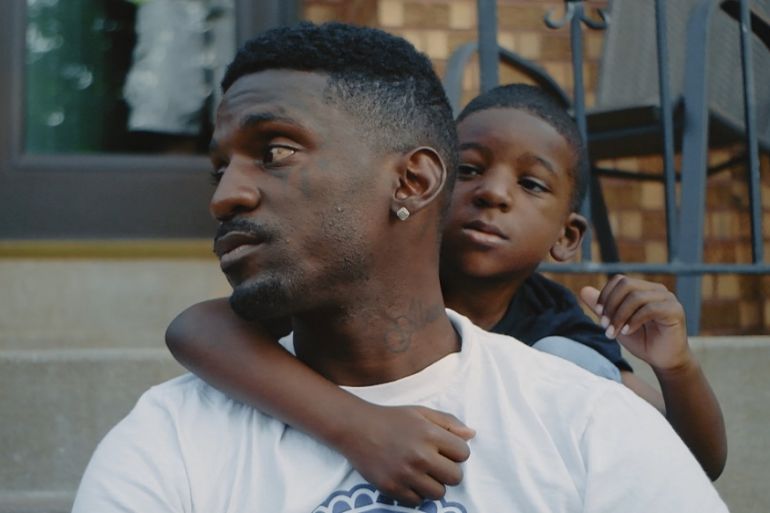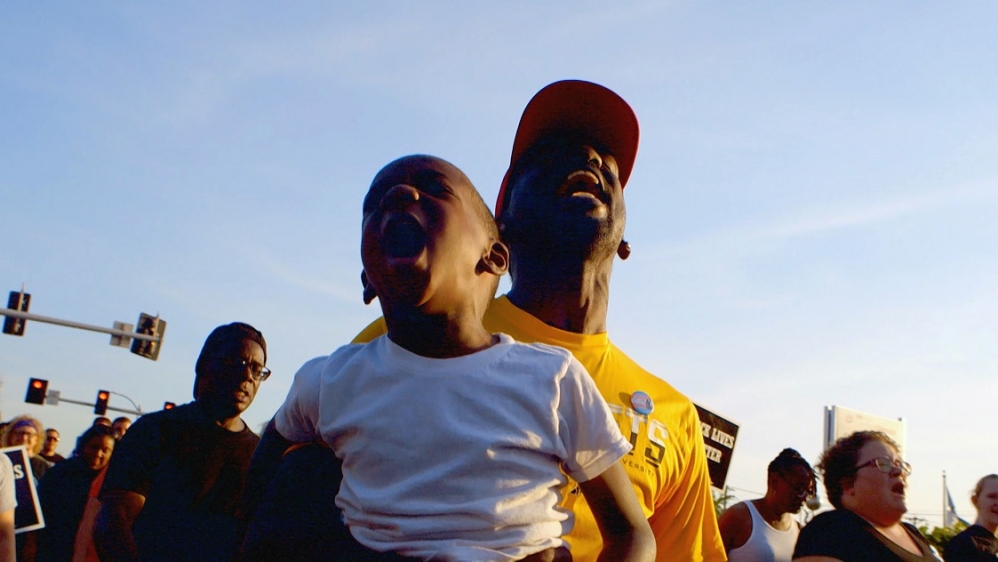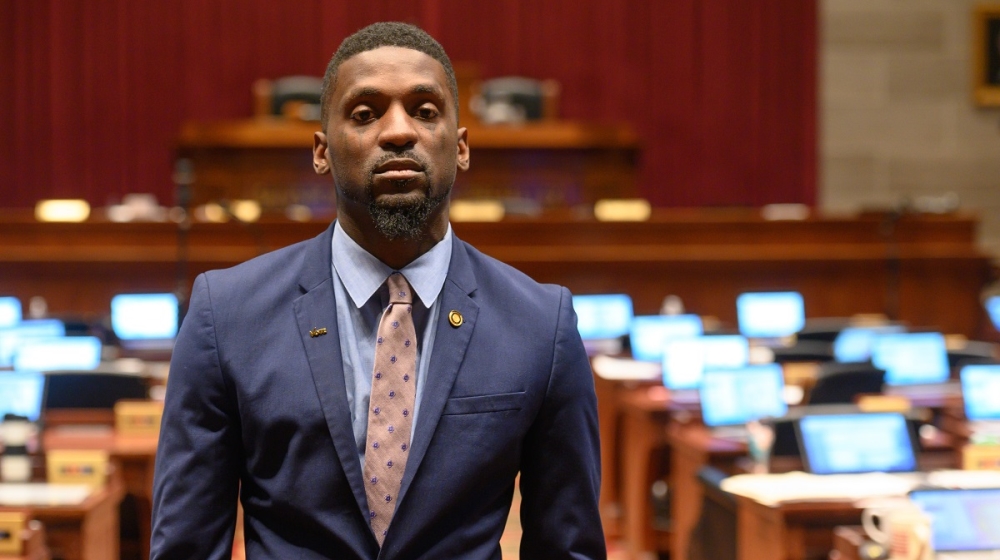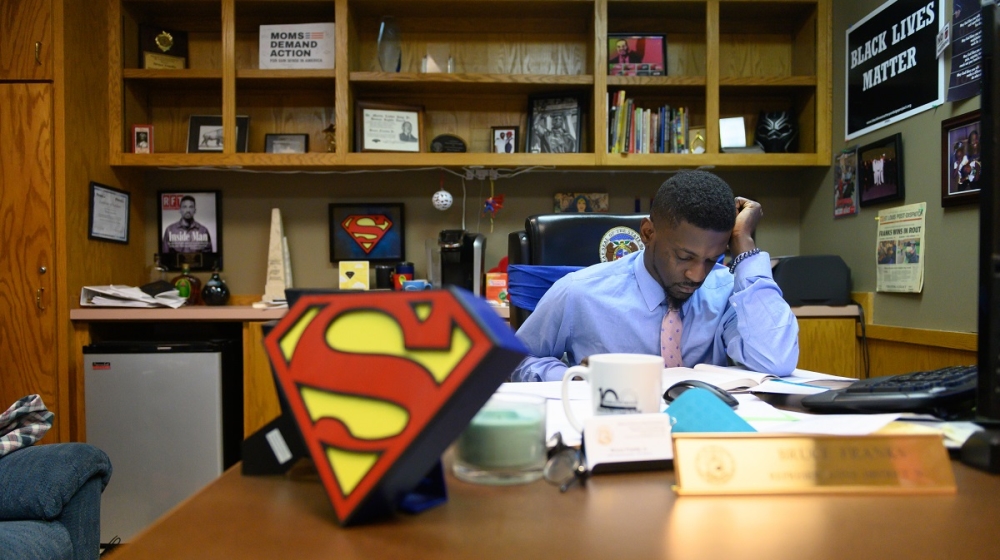‘St Louis Superman’ Bruce Franks Jr on giving his community hope
The activist and former Missouri lawmaker describes fighting for his community on the streets and the legislature floor.

Bruce Franks Jr, an activist, battle rapper and father, began advocating for his St Louis community when Michael Brown, an unarmed black teenager, was shot by police in 2014. He mentored youth, helped people secure jobs and served as a liaison between the community and police before being elected to Missouri’s House of Representatives in 2016.
On the House floor, he successfully passed a state law that deemed youth violence a public health emergency and declared June 7th Christopher Harris day, in honour of Franks’ brother who was fatally shot when he was just nine years old. His story is told in the Oscar-nominated documentary St Louis Superman.
Keep reading
list of 4 items‘Mama we’re dying’: Only able to hear her kids in Gaza in their final days
Europe pledges to boost aid to Sudan on unwelcome war anniversary
Birth, death, escape: Three women’s struggle through Sudan’s war
Al Jazeera: Can you tell us a little about yourself?
Bruce Franks Jr: I am a young black kid from one of the roughest neighbourhoods in St Louis, which is not only at the top of the list when it comes to gun violence and murders, but is also one of the most dangerous cities in the world.
In 1991, my brother, Christopher Harris, was killed. And that was my first experience with gun violence and my first experience with funerals. Little did I know that there would be many more.
My life has involved a lot of funerals and a lot of systemic oppression. It numbed me just like it does so many other people from communities like mine. But it woke me up on August 9, 2014, when Michael Brown was shot by the police [in Ferguson, Missouri, a suburb of St Louis].
Al Jazeera: Where were you when Michael Brown was killed?
Franks: I was at home about 15 minutes away getting ready for my son’s first birthday. We were blowing up balloons and decorating the house because we were going to have a party for him.
He was just learning how to walk, he was stumbling around the house, and I saw a post from my friend of a man, who we now know to be Michael Brown’s stepfather, holding a sign that said, ‘Ferguson police just killed my son’.
And I said, ‘You know what, damn, that’s messed up’ and I kind of left it at that. But then I saw the pictures online, I saw the videos of his body in the middle of the street, and that took a different toll on me.

Al Jazeera: Can you talk about the protests that followed his death?
Franks: Before Michael Brown was killed, I had never protested. But I remember seeing his body in the street, I remember all the social media around it, and I remember thinking to myself: in 16 years, 17 years this could be my son. What would I want to do, what would I want people to do, if this happened?
I know that’s what sparked me to go out there, but I didn’t know what I was getting into. I saw the streets filled with folks who looked like me and folks who didn’t look like me, but the one common denominator was the hurt and the pain of seeing this young man’s body in the street and it being done to him by the people we say are supposed to protect us.
And so that kind of sparked a different anger inside of me that was pure anger until I learned how to organise and take – I don’t want to say more effective routes – but take different routes, because I think everything can be effective in protests and in rebellion, whether we deem it peaceful or nonpeaceful, whether we deem it realistically violent or non-violent. Because if a building gets burned down they call it violence, even though it’s not done to a person. But they shy away from what’s done to young black men and people of colour by police violence. And so I think they are all effective. But I did learn different ways of being effective.
And a lot of people don’t know we were in the streets of Ferguson for 400 days; tear gas, pepper spray, militarised police, anxiety, depression, there were a bunch of different things we had to deal with out there.
Al Jazeera: Did you know Michael Brown personally?
Franks: I didn’t know Michael Brown at all. But I saw a young black man on the ground that looked familiar to so many black faces and so many black young men that I know around my city and I know around this country. So I didn’t know him personally but I knew him.
Al Jazeera: Once the protests started, how did the community change?
Franks: There were many different stories that weren’t told. You had the people that lived directly in Ferguson, some who were out there with us, some who were fighting with us, and some who were just trying to survive and these protests made life harder for them.
They had to get their kids to school, they had to walk to the grocery store, they might not have public transportation. Especially when everything within a one or two-mile radius shut down, they had to make extra efforts to go elsewhere, and they might not have had those resources.
You had this sense of unity with folks as well, who all came together to fight for a particular reason, who came to fight because of this tragedy.
And so the temperature was different, depending on who you were and how you saw things.
Al Jazeera: What was it like when the protests ended?
Franks: It was a continuous fight because in St Louis we still had people getting killed by the police. We had an average of, for the next two years, somebody getting killed by the police every month.
There was never a time to decompress or step back. And I think the effects of that protest we didn’t necessarily understand until now; how us being in the streets every day affected us mentally.
I think back to some of those who stood next to me or who fought with me or who got pepper-sprayed and tear-gassed that aren’t here to tell that story because of the mental strain that they were dealing with. It’s heavy when you are coming out of those protests.
I’m thinking about people like Erica Garner – Eric Garner’s daughter – who passed away at a young age, and the stress and the heaviness of what we were out there doing and what we were encountering every day and trying to take it home and still live life and still have the energy and power to keep going. It was hard.

Al Jazeera: Where were you when you decided to run for state representative?
Franks: I was in St Louis and the community had a meeting about this new political revolution that needed to happen. And I got invited to the meeting. I didn’t know that people were going to ask me to run for state representative.
I was like ‘Ok, I really don’t know what a state representative is but y’all being my people I’m down. I’m cool with that.’
What enticed me was that it was all people from our community that were coming together and saying ‘Hey, we are tired of what politics looks like, how about we get some real people in these positions in order to fight?’
I was like, ‘You know what y’all right. I may not know what I’m doing, I may not figure it all out right now, but let’s do it.’ And so I decided to say yes and that was it.
I was already doing community work and I knew my community. I would be running against an incumbent who had name recognition – but I had name recognition just from the work that I was doing and how entrenched in the community I was.
Al Jazeera: And what was it like on your first day as representative?
Franks: I loved seeing all these shocked faces at this young black dude with tattoos on his face walking around with a ‘I’m rooting for everybody black’ hoodie on. But it was great.
It was hard. I had to spend a lot of time talking to people to get them to understand where I come from and why I fight so hard.
But I think the one thing that anybody could say in the House of Representatives was ‘whether we agree or disagree with Bruce Franks we respect his passion and his fight and his will for his people.’ And that’s one thing that I earned by communicating with everybody and making sure I’m upfront with everybody and that they understand that I’m not wavering and I’m not selling out my community and I’m not selling my soul.

Al Jazeera: Can you describe what a day was like as state representative?
Franks: On my days in the House, I got to my office about 6 or 6:30am, looked at the bills that would be coming up in different committees, ones that would be coming up on the floor that I would either oppose or support, get my facts and my rebuttals and my A-game together, and also handle constituent services with my assistant, checking those letters that were written to us from our incarcerated community, and responding to them, seeing if there were ways I could help them, seeing if there was hope that I could give them.
Usually, I was working 12, 14, 16 hour days. Sometimes I’d spend the night. And when I was back in the community, I was away from home, away from my kids, out all times of the night because there were people dying, there were people that needed stuff and I was more hands-on than probably a lot of state reps – not all of them because we have some – but I was more in tune with my community, and I refused to sit back when I saw something happening. And so that’s what kind of weighed on me and burned me out, though.
Where I am from we grew up with this notion that our vote didn’t count, that the system was set up, it was rigged anyway, and when you look around our community, how could we not feel that way? How could we not feel like our vote didn’t count when we had all these people in place for all these years and our communities looked the same exact way that they’ve always looked?
A good portion of my votes were from people who hadn’t voted in forever. Because I took the time out to go say ‘Hey what’s going on, why’d you not vote?’ And they’d say ‘Ah well, nobody came and told us and they don’t work’, and I’d say ‘That’s how I felt before I decided to run for office. But now we have somebody who is going to get into office who understands exactly how you feel, is going to fight every single day even if it kills me to make sure that our voices are heard, the ones that they’ve forgotten about, the ones that they’ve pushed out, the ones they say our voice didn’t matter. I’m going to ensure that our vote matters. But the only way to ensure that our vote is going to matter is if you show up.’
Al Jazeera: What needs to change in terms of representation?
Franks: First, I would have a much fairer way to draw district lines so they could encompass those communities of like mind.
States have been able to get away with gerrymandering districts. We sue them and they get to the Supreme Court, and the Supreme Court kicks it back to the state and says you deal with it however you deal with it. So it’s back in the hands of the Republican state that put this process in place in the beginning.
On a local level, we talk about campaign finance and keeping big money out of politics. But you have black candidates who historically don’t raise as much as white candidates, who don’t have as many resources as white candidates, and then you have Democratic candidates who don’t raise as much as Republican candidates. So when we talk about campaign finance, yes we should absolutely keep big money out of politics, but some of these campaign finance limits on a local level are actually hurting local elected officials.
I have a problem with those counties where the people inside of jails are counted as part of the population for that county but that representative doesn’t have to represent them, and they don’t get a vote in certain states. Whether you are locked up or not, you should still be able to vote. If you are counted as part of the population then you should absolutely get a vote, period.
On a national level, I would get rid of the electoral college. There’s no way that certain states should have more weight than other states that have a higher population of people. And you think about these places they concentrate on for primaries and presidential primaries like Iowa, like New Hampshire, and we talk about racial equity in an electoral process, there aren’t too many people that look like me in New Hampshire and Iowa. And so to put these places in this upper echelon for who should be deciding who runs our country, that’s a problem.
This Q&A has been edited for brevity and clarity.